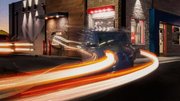News
Who's Who: Julian Bowron
The son of a beatnik, The Kiosk Factory founder and president has parlayed his bohemian upbringing and creative instincts to create some of the kiosk's industry's most unique deployments.
September 30, 2002
From Egyptian pharaohs to Ming warriors, nappily attired butlers to space aliens, it is clear that the enclosures that come out of The Kiosk Factory's facility in Toronto are different from the computer-in-a-box model that graces so many kiosk projects.
Of course, not many kiosk companies are started by someone with five years' experience in a wood-carving guild in British Columbia.
The Kiosk Factory president Julian Bowron is a standout in the kiosk industry, not just because of the distinctive, artistic kiosks his company has manufactured since its launch in 1998. He also brings a creative arts background unlike practically anyone else in the industry.
The son of a member of Toronto's beatnik-era arts scene, Bowron grew up looking at life through a slightly different pair of lenses.
 |
Julian Bowron |
"I grew up in downtown Toronto and was basically pushed around in the baby carriage from one art gallery to another," said the 44-year-old Bowron. "When I was young I grew up around it. My dad was a beatnik and I've got a lot of photos of him with the beard and moustache in a black turtleneck sweater listening to poets in the coffeehouse."
Through the kiosk and exhibit-design industries, Bowron has found a way to live in the business world while applying the ethics and lessons he learned growing up.
Working both sides of the brain
Helping others while dealing with money -- often polar opposites in the business world but a key element to the kiosk sector -- was something that Bowron learned at an early age.
"I'd run coat checks at my dad's parties and collect money for charity," he said. "There was a big earthquake in Nicaragua around 1971 or `72 and I raised $50 or $60 for earthquake relief by basically blackmailing dad's friends of their coats."
 |
The Kiosk Factory's butler enclosure, which the company showcased at KioskCom 2002, is an example of Julian Bowron's vision of creative kiosk designs. |
But Bowron found his calling not in the gritty arts scene of downtown Toronto, but in the towering forests and mountains of the Canadian Pacific. He went to British Columbia in the mid 1970s and spent five years studying with the Ne Chi Zu Guild, ending his apprenticeship in 1979. He learned the skills of wood-carving with native and non-native artists, and developed an appreciation for epic projects.
"We worked almost exclusively with monumental pieces, West Coast cedar carvings," he said. "We would go out in the forests and find a massive cedar tree and bring it back. It would take 10 people six months to carve it. When I got back to Toronto I wanted to start a dramatic business."
While studying industrial design at the Ontario College of Art, he did just that, starting The Feature Factory in 1984.
"My desire led me quite by accident to the exhibit industry, because that is where the customers were coming from," he said. "They wanted grand exhibits, a World War I biplane, a 3D fish, a fantasy race car, you name it."
Exhibits provided a natural extension to kiosks, and the launch of The Kiosk Factory in 1998. Even before launching the business, Bowron said The Feature Factory was doing projects that would count as kiosk deployments.
"We called them public information terminals," he said. "In fact, we had a whole bunch of different words for them. But then one day we got an e-mail from KioskCom and it was like, `OK, these are called kiosks.' "
Down, then back up
The Kiosk Factory's main claim to fame is its work for Canadian theater chain Famous Players. The alien, pharaoh, and Ming kiosks are all part of movie-ticketing kiosks that the company, working with Canadian point-of-sale developer RDS Data Group Inc., designed for the chain.
Name: Julian Bowron |
RDS president Steve Jackson said the project is a reflection of Bowron's vision and his ability to make things happen.
"He's the most positive thinker I've ever come across and he backs it with action," Jackson said. "If Julian couldn't do this it would break his heart. He's an amazing talent."
But the Famous Players project has been a learning experience for Bowron from a business, as well as creative, standpoint.
Buoyed by the Famous Players deployment, The Kiosk Factory generated revenue of more than $2 million in 2000, but that figure dropped to just under $100,000 in 2001 as economic conditions and the fickle nature of the movie business affected the company's bottom line.
"I recognized two years ago that you can't only be in one line of kiosks," Bowron said. "In the theater business, things right now are very sporadic because the industry is really down. The demand (for ticketing kiosks) simply is not there."
Diversification has reaped benefits for The Kiosk Factory, which has turned things around, according to Bowron, and will generate revenue of $1.8 million for the fiscal year ending Nov. 31.
"What's really doing it for us now is tough applications, exterior, public, government, unattended units, that kind of thing," he said.
Time to relax
With business picking back up again, Bowron has the time and freedom to enjoy life and indulge his creative instincts. And with his 20-year-old daughter, Flurina, attending medical school in Switzerland, he is on his own.
Bowron's latest project is a 1 1/2-mile stretch of river and land near Toronto that he recently purchased.
"I'm building a cabin to live in," he said. "I really already live there."
With his artistic sense and background in wood carving, it appears that Bowron has found a domestic situation that fits him just as well as the kiosk industry fits his business aspirations.












